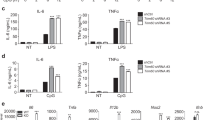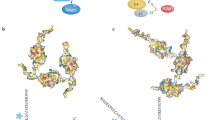Abstract
SUMOylation has been considered as an important mechanism to regulate multiple cellular processes, including inflammation. TAB2 (TAK1-binding protein 2) is an upstream adaptor protein in the IL-1 signaling pathway. Covalent modifications of TAB2 have not been well studied. In this study, we demonstrated that TAB2 could be modified by SUMO. Using Ubc9 (SUMO-conjugating enzyme) fusion and mutation analysis, we identified evolutionarily conserved lysine 329 as the major SUMOylation site of TAB2. PIAS3, a SUMO E3 ligase, preferentially interacted with and promoted its SUMOylation. Interestingly, block of SUMOylation by mutation of lysine 329 enhanced the activity of TAB2, as reflected by AP-1 luciferase reporter assays. Taken together, these results suggest that SUMOylation may serve as a novel mechanism for the regulation of TAB2.





Similar content being viewed by others
References
Besse A, Lamothe B, Campos AD, Webster WK, Maddineni U, Lin SC, Wu H, Darnay BG (2007) TAK1-dependent signaling requires functional interaction with TAB2/TAB3. J Biol Chem 282:3918–3928
Morlon A, Munnich A, Smahi A (2005) TAB2, TRAF6 and TAK1 are involved in NF-kappaB activation induced by the TNF-receptor, Edar and its adaptator Edaradd. Hum Mol Genet 14:3751–3757
Shibuya H, Yamaguchi K, Shirakabe K, Tonegawa A, Gotoh Y, Ueno N, Irie K, Nishida E, Matsumoto K (1996) TAB1: an activator of the TAK1 MAPKKK in TGF-beta signal transduction. Science 272:1179–1182
Takaesu G, Kishida S, Hiyama A, Yamaguchi K, Shibuya H, Irie K, Ninomiya-Tsuji J, Matsumoto K (2000) TAB2, a novel adaptor protein, mediates activation of TAK1 MAPKKK by linking TAK1 to TRAF6 in the IL-1 signal transduction pathway. Mol Cell 5:649–658
Deng L, Wang C, Spencer E, Yang L, Braun A, You J, Slaughter C, Pickart C, Chen ZJ (2000) Activation of the IkappaB kinase complex by TRAF6 requires a dimeric ubiquitin-conjugating enzyme complex and a unique polyubiquitin chain. Cell 103:351–361
Kanayama A, Seth RB, Sun L, Ea CK, Hong M, Shaito A, Chiu YH, Deng L, Chen ZJ (2004) TAB2 and TAB3 activate the NF-kappaB pathway through binding to polyubiquitin chains. Mol Cell 15:535–548
Sanjo H, Takeda K, Tsujimura T, Ninomiya-Tsuji J, Matsumoto K, Akira S (2003) TAB2 is essential for prevention of apoptosis in fetal liver but not for interleukin-1 signaling. Mol Cell Biol 23:1231–1238
Hay RT (2005) SUMO: a history of modification. Mol Cell 18:1–12
Johnson ES (2004) Protein modification by SUMO. Annu Rev Biochem 73:355–382
Bohren KM, Nadkarni V, Song JH, Gabbay KH, Owerbach D (2004) A M55 V polymorphism in a novel SUMO gene (SUMO-4) differentially activates heat shock transcription factors and is associated with susceptibility to type I diabetes mellitus. J Biol Chem 279:27233–27238
Jackson PK (2001) A new RING for SUMO:wrestling transcriptional responses into nuclear bodies with PIAS family E3 SUMO ligases. Genes Dev 15:3053–3058
Kagey MH, Melhuish TA, Wotton D (2003) The polycomb protein Pc2 is a SUMO E3. Cell 113:127–137
Pichler A, Gast A, Seeler JS, Dejean A, Melchior F (2002) The nucleoporin RanBP2 has SUMO1 E3 ligase activity. Cell 108:109–120
Gill G (2004) SUMO and ubiquitin in the nucleus: different functions, similar mechanisms? Genes Dev 18:2046–2059
Mukhopadhyay D, Dasso M (2007) Modification in reverse: the SUMO proteases. Trends Biochem Sci 32:286–295
Huang TT, Wuerzberger-Davis SM, Wu ZH, Miyamoto S (2003) Sequential modification of NEMO/IKKgamma by SUMO-1 and ubiquitin mediates NF-kappaB activation by genotoxic stress. Cell 115:565–576
Cheng J, Perkins ND, Yeh ET (2005) Differential regulation of c-Jun-dependent transcription by SUMO-specific proteases. J Biol Chem 280:14492–14498
Cao Y, Liu R, Jiang X, Lu J, Jiang J, Zhang C, Li X, Ning G (2009) Nuclear-cytoplasmic shuttling of menin regulates nuclear translocation of β-catenin. Mol Cell Biol 29:5477–5487
Jakobs A, Himstedt F, Funk M, Korn B, Gaestel M, Niedenthal R (2007) Ubc9 fusion-directed SUMOylation identifies constitutive and inducible SUMOylation. Nucl Acids Res 35:e109
Jakobs A, Koehnke J, Himstedt F, Funk M, Korn B, Gaestel M, Niedenthal R (2007) Ubc9 fusion-directed SUMOylation (UFDS): a method to analyze function of protein SUMOylation. Nat Methods 4:245–250
Shuai K, Liu B (2005) Regulation of gene-activation pathways by PIAS proteins in the immune system. Nat Rev Immunol 5:593–605
Hong S, Lim S, Li AG, Lee C, Lee YS, Lee EK, Park SH, Wang XJ, Kim SJ (2007) Smad7 binds to the adaptors TAB2 and TAB3 to block recruitment of the kinase TAK1 to the adaptor TRAF2. Nat Immunol 8:504–513
Ma Q, Zhou L, Shi H, Huo K (2008) NUMBL interacts with TAB2 and inhibits TNFalpha and IL-1beta-induced NF-kappaB activation. Cell Signal 20:1044–1051
Zhuang ZH, Sun L, Kong L, Hu JH, Yu MC, Reinach P, Zang JW, Ge BX (2006) Drosophila TAB2 is required for the immune activation of JNK and NF-kappaB. Cell Signal 18:964–970
Yang SH, Galanis A, Witty J, Sharrocks AD (2006) An extended consensus motif enhances the specificity of substrate modification by SUMO. EMBO J 25:5083–5093
Baek SH, Ohgi KA, Rose DW, Koo EH, Glass CK, Rosenfeld MG (2002) Exchange of N-CoR corepressor and Tip60 coactivator complexes links gene expression by NF-kappaB and beta-amyloid precursor protein. Cell 110:55–67
Zhao X, Sternsdorf T, Bolger TA, Evans RM, Yao TP (2005) Regulation of MEF2 by histone deacetylase 4- and SIRT1 deacetylase-mediated lysine modifications. Mol Cell Biol 25:8456–8464
Li M, Wang H, Huang T, Wang J, Ding Y, Li Z, Zhang J, Li L (2010) TAB2 scaffolds TAK1 and NLK in repressing canonical Wnt signaling. J Biol Chem 30:13397–13404
Acknowledgments
We are grateful to Imelda Lee from Shanghai Clinical Center for Endocrine and Metabolic Diseases for critical readings. This study was supported by the Grants from National Natural Science Foundation of China (No. 30871203 and No. 30900702), Shanghai Committee for Science and Technology (No. 08DZ2271000), and Shanghai Municipal Natural Science Foundation (No. 09ZR1427600).
Author information
Authors and Affiliations
Corresponding author
Rights and permissions
About this article
Cite this article
Wang, X., Jiang, J., Lu, Y. et al. TAB2, an important upstream adaptor of interleukin-1 signaling pathway, is subject to SUMOylation. Mol Cell Biochem 385, 69–77 (2014). https://doi.org/10.1007/s11010-013-1815-3
Received:
Accepted:
Published:
Issue Date:
DOI: https://doi.org/10.1007/s11010-013-1815-3




